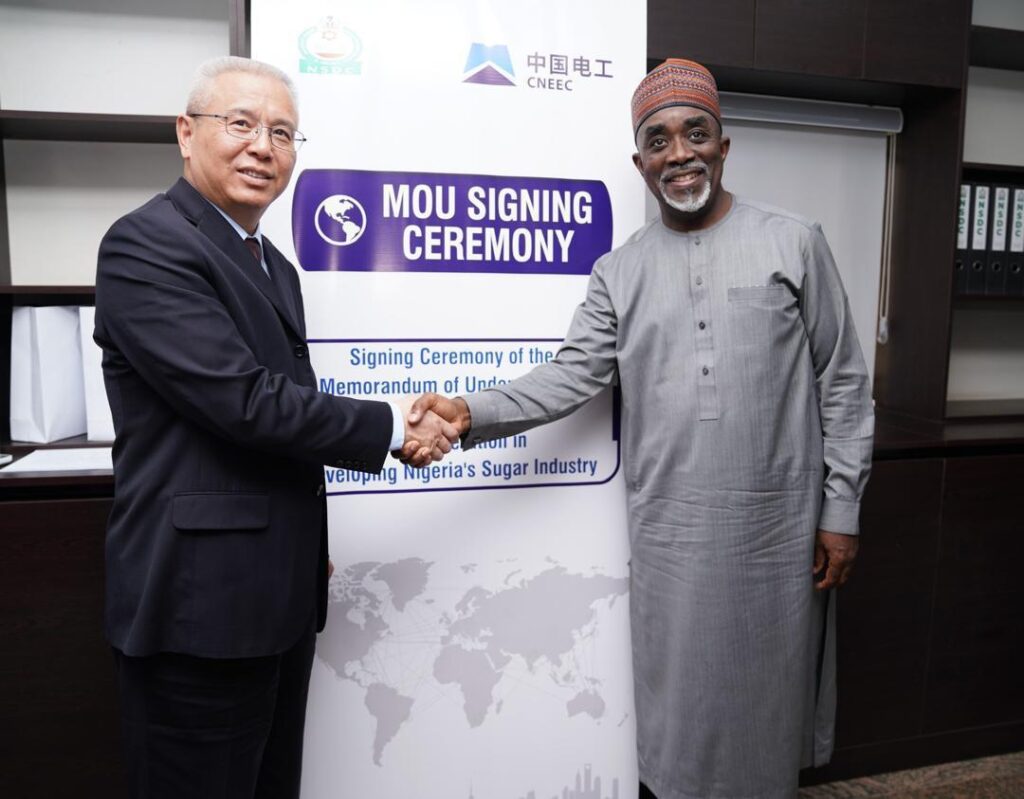From Atiku Sarki, Abuja
The National Sugar Development Council (NSDC) has signed a significant Memorandum of Understanding (MoU) with SINOMACH, a Chinese conglomerate, to develop a comprehensive sugarcane cultivation and processing project capable of producing one million metric tonnes of sugar annually in Nigeria.
This MoU, an early achievement of the Nigeria-China Strategic Partnership—an initiative spearheaded by President Bola Ahmed Tinubu—could potentially attract investments totaling up to one billion dollars into Nigeria’s sugar industry.
Under the agreement, SINOMACH will begin by constructing a sugar production plant and a sugarcane plantation with an annual production capacity of 100,000 metric tonnes. The NSDC will facilitate the necessary authorizations, approvals, and permissions to implement the project, which is expected to more than double Nigeria’s annual local sugar production.
SINOMACH will leverage its extensive expertise, resources, and experience to execute the project on an Engineering, Procurement, and Construction (EPC) basis, with one of the primary advantages being the company’s role in financing the project.
Speaking at the signing ceremony in Abuja, the Executive Secretary/CEO of NSDC, Mr. Kamar Bakrin, emphasized that 2025 represents a pivotal year for Nigeria’s development.
“It is a crucial period during which we expect to make significant strides toward economic self-sufficiency and food security, especially in light of the fiscal pressures Nigeria faces,” he said.
Mr. Bakrin continued, “A strong sugar industry will bring multiple benefits to Nigeria, including the creation of thousands of sustainable jobs across the value chain. Sugar cultivation and processing will also drive rural infrastructure development, while significantly reducing foreign exchange spending by substituting imports, which currently account for most of the country’s sugar consumption.”
He further noted, “We envision a fully developed sugar sector that will serve as a blueprint for Nigeria’s broader industrialization strategy. China, being the world leader in industrialization, is well-positioned to understand this vision. We believe that the sugar industry can provide a model for other sectors of Nigeria’s industrialization, with a strategic approach to development, the establishment of enabling policies, aggregation of critical production inputs, acquisition of technical skills, and innovative financing solutions.”
The MoU, Mr. Bakrin added, marks the beginning of what is expected to be a long-term partnership that could ultimately produce one million metric tonnes of locally grown sugar, strengthening Nigeria’s domestic production capacity and reducing reliance on imports. He described the project as a unique model, combining both EPC and development financing—essential for agro-industrial development in the country.
SINOMACH’s Vice President, Li Xiao Yu, praised Nigeria’s ambitious Nigeria Sugar Master Plan (NSMP) and its goal of achieving self-sufficiency in sugar production.
“We deeply admire this vision,” Li said. “It represents not only an industrial policy but also a sweet revolution tied to food sovereignty and economic dignity. We are confident that, through our joint efforts, the plantation and sugar mill project will enhance Nigeria’s sugar self-sufficiency, spur economic development in surrounding areas, create substantial employment, modernize the agricultural value chain, and generate long-term social benefits.”
Li continued, “We view our partnership with NSDC not just as a commercial venture but as a significant step toward implementing the shared vision of our two heads of state to foster agricultural cooperation and mutual development.”
He added, “We are also exploring RMB-based financing models to support our collaboration, contributing to the internationalization of the Chinese currency, diversifying Nigeria’s financing options, reducing costs, and expediting project approvals in China. This will ensure stable and efficient funding for the project.”
Li expressed hope that the state chosen to host the project could ultimately become the “Sugar Bowl of West Africa.”


